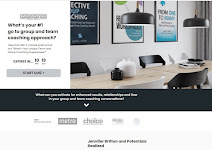This week we’re covering Group Coaching Core Essentials #8 as part of our 18th anniversary
celebrations. This week’s principle is Leverage the life experience and expertise of the group.
A shift in the group coaching space, where the coach can
take a back seat to the members of the group. This may seem even more pronounced,
especially if our group size is 6, or 10 or 12. Notice how much time you are
inserting yourself as a group coach.
Once trust, safety and connection is created, how do we step
back and ensure that the group owns the process? A key part of this relates to
this week’s topic of utilize the life experience and expertise of the group.
Unlike training or facilitation where the content expert is
usually the leader, in a group coaching process, this role around content and
technical expertise my go to different group members.
Principle – Leverage the life experience and the expertise of
the group.
Action:
Consider having people:
·
Share their superpower
as part of the group introductions
·
Have the group in
the first call note what their collective baseline is (i.e. What do you notice
about the skills and experiences you bring)?
·
Volunteer what role
they can take on – i.e. there may be a group social coordinator, someone who
likes to take time, someone who might want to convene meetings in between the group
calls, someone who wants to set up a book list or book discussion on topics you
are working on.
Being a great group coach
requires a level of humility and a checking of the ego, and belief that we need
to be the central part of the process. Over time together, the group coach
often fades out more and more and more.
Action: Consider this week what
you will do to cultivate an environment where the group “owns” the
process. Consider what opportunities group members have to share their experience
and expertise.
Consider the following
questions to spark the conversation:
- What are you bringing to our group experience? (Share your skills and experiences)
- What can we do as a group to ensure that you get to lead from your superpower every time we are together?
- What role would you like to play in our group process?
- Groups need support around achieving both results and relationships. As a group consider what those roles may be – ie. time keeper, social coordinator, researcher etc)
- What else can we be doing to harness what you bring naturally, based on your experiences and expertise?
- What are you doing to boost the connection amongst group members, not only with you? (One of the components our group members enjoy are the cohort groups which are part of the larger ConversationSparker community hub we manage (based on the Mighty Networks platform).
For more on the triad of
trust, safety and connection and how important it is in the virtual, remote and
hybrid space, be sure to check out my TEDx talk from last summer on the
Virtual, Remote and Hybrid Checklist.
If you have a copy of my most recent book, Reconnecting Workspaces, check out chapter 5 for more on the Triad of Trust, Safety and Connection.
Enjoy your conversations!
Jennifer
Upcoming Summer 2022 Learning opportunities:
Group Coaching Essentials (8.75 CCEs) - Join us in July and August on Wednesdays 830 - 10 am ET starting July 27th for 4 weeks (with Evana)
Team Coaching Essentials (14 CCEs) - next starts on Monday September 12th, running for 6 90 minute sessions
Advanced Group and Team Coaching Practicum (10 CCEs): Starting July 26th - Tuesdays 830-10 am Et: July 26, August 9, 16, 23, and 30, 2022 - With Evana
Mentor Coaching Group - for ACC/PCC - Fridays 9 - 10 am ET starting September 9 and running to December 9th. Reserve your spot.
Reconnecting Workspaces Certified Coach (24 CCEs)- Specialist in Hybrid and Remote Workspaces: Tuesdays and Wednesdays in August, starting August 3, 2022 and running to August 16. 24 CCEs. Learn more here and early bird rate on until Monday July 25th (18% off in lieu of our anniversary)
Jennifer is also the author of Effective Group Coaching (2010), Coaching Business Builder (2018), Effective Virtual Conversations (2017) and From One to Many: Best Practices for Team and Group Coaching (2013). Check out her author page on Amazon for all publications.
Want to know what's new? Looking for remote and hybrid resources - Pick up a copy of the Reconnecting Workspaces book or the 90-Day Guide for Success (ideal for those onboarding in the remote or hybrid space, OR wanting a 90 day sprint). Instagram: @ReconnectingWorkspaces
.png)

















